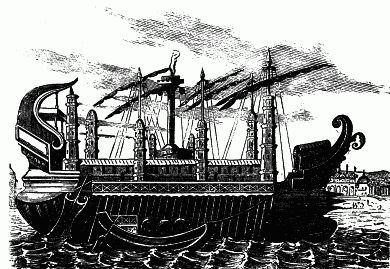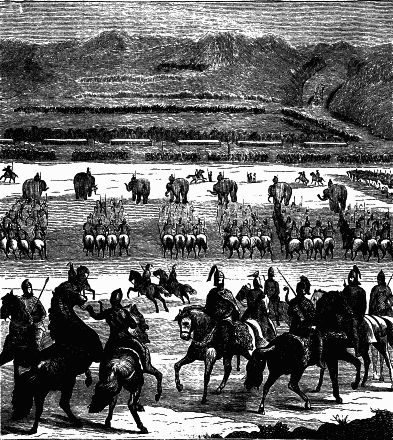
We are now come to the time when Rome became mixed up in wars with nations beyond Italy. There was a great settlement of the Phoenicians, the merchants of the old world, at Carthage, on the northern coast of Africa, the same place at which Virgil afterwards described Æneas as spending so much time. Dido, the queen who was said to have founded Carthage when fleeing from her wicked brother-in-law at Tyre, is thought to have been an old goddess, and the religion and manners of the Carthaginians were thoroughly Phoenician, or, as the Romans called them, Punic. They had no king, but a Senate, and therewith rulers called by the name that is translated as judges in the Bible; and they did not love war, only trade, and spread out their settlements for this purpose all over the coast of the Mediterranean, from Spain to the Black Sea, wherever a country had mines, wool, dyes, spices, or men to trade with; and their sailors were the boldest to be found anywhere, and were the only ones who had passed beyond the Pillars of Hercules, namely, the Straits of Gibraltar, in the Atlantic Ocean. They built handsome cities, and country houses with farms and gardens round them, and had all tokens of wealth and luxury—ivory, jewels, and spices from India, pearls from the Persian Gulf, gold from Spain, silver from the Balearic Isles, tin from the Scilly Isles, amber from the Baltic; and they had forts to protect their settlements. They generally hired the men of the countries, where they settled, to fight their battles, sometimes under hired Greek captains, but often under generals of their own.

The first place where they did not have everything their own way was Sicily. The old inhabitants of the island were called Sicels, a rough people; but besides these there were a great number of Greek settlements, also of Carthaginian ones, and these two hated one another. The Carthaginians tried to overthrow the Greeks, and Pyrrhus, by coming to help his countrymen, only made them more bitter against one another. When he went away he exclaimed, "What an arena we leave for the Romans and Carthaginians to contend upon!" so sure was he that these two great nations must soon fight out the struggle for power.
The beginning of the struggle was, however, brought on by another cause. Messina, the place founded long ago by the brave exiles of Messene, when the Spartans had conquered their state, had been seized by a troop of Mamertines, fierce Italians from Mamertum; and these, on being threatened by Xiero, king of Syracuse, sent to offer to become subjects to the Romans, thus giving them the command of the port which secured the entrance of the island. The Senate had great scruples about accepting the offer, and supporting a set of mere robbers; but the two consuls and all the people could not withstand the temptation, and it was resolved to assist the Mamertines. Thus began what was called the First Punic War. The difficulty was, however, want of ships. The Romans had none of their own, and though they collected a few from their Greek allies in Italy, it was not in time to prevent some of the Mamertines from surrendering the citadel to Xanno, the Carthaginian general, who thought himself secure, and came down to treat with the Roman tribune Claudius, haughtily bidding the Romans no more to try to meddle with the sea, for they should not be allowed so much as to wash their hands in it. Claudius, angered at this, treacherously laid hands on Xanno, and he agreed to give up the castle on being set free; but he had better have remained a prisoner, for the Carthaginians punished him with crucifixion, and besieged Messina, but in vain.
The Romans felt that a fleet was necessary, and set to work to build war galleys on the pattern of a Carthaginian one which had been wrecked upon their coast. While a hundred ships were building, oarsmen were trained to row on dry land, and in two months the fleet put to sea. Knowing that there was no chance of being able to fight according to the regular rules of running the beaks of their galleys into the sides of those of their enemies, they devised new plans of letting heavy weights descend on the ships of the opposite fleet, and then of letting drawbridges down by which to board them. The Carthaginians, surprised and dismayed, when thus attacked off Mylæ by the consul Duilius, were beaten and chased to Sardinia, where their unhappy commander was nailed to a cross by his own soldiers; while Duilius not only received in Rome a grand triumph for his first naval victory, but it was decreed that he should never go out into the city at night without a procession of torch-bearers.
The Romans now made up their minds to send an expedition to attack the Carthaginian power not only in Sicily but in Africa, and this was placed under the command of a sturdy plebeian consul, Marcus Attilius Regulus. He fought a great battle with the Carthaginian fleet on his way, and he had even more difficulty with his troops, who greatly dreaded the landing in Africa as a place of unknown terror. He landed, however, at some distance from the city, and did not at once advance on it. When he did, according to the story current at Rome, he encountered on the banks of the River Bagrada an enormous serpent, whose poisonous breath killed all who approached it, and on whose scales darts had no effect. At last the machines for throwing huge stones against city walls were used against it; its backbone was broken, and it was at last killed, and its skin sent to Rome.
The Romans met other enemies, whom they defeated, and gained much plunder. The Senate, understanding that the Carthaginians were cooped up within their walls, recalled half the army. Regulus wished much to return, as the slave who tilled his little farm had run away with his plough, and his wife was in distress; but he was so valuable that he could not be recalled, and he remained and soon took Tunis. The Carthaginians tried to win their gods' favor back by offering horrid human sacrifices to Moloch and Baal, and then hired a Spartan general named Xanthippus, who defeated the Romans, chiefly by means of the elephants, and made Regulus prisoner. The Romans, who hated the Carthaginians so much as to believe them capable of any wickedness, declared that in their jealousy of Xanthippus' victory, they sent him home to Greece in a vessel so arranged as to founder at sea.

However, the Romans, after several disasters in Sicily, gained a great victory near Panormus, capturing one hundred elephants, which were brought to Rome to be hunted by the people that they might lose their fear of them. The Carthaginians were weakened enough to desire peace, and they sent Regulus to propose it, making him swear to return if he did not succeed. He came to the outskirts of the city, but would not enter. He said he was no Roman proconsul, but the slave of Carthage. However, the Senate came out to hear him, and he gave the message, but added that the Romans ought not to accept these terms, but to stand out for much better ones, giving such reasons that the whole people was persuaded. He was entreated to remain and not meet the angry men of Carthage; but nothing would persuade him to break his word, and he went back. The Romans told dreadful stories of the treatment he met with—how his eyelids were cut off and he was put in the sunshine, and at last he was nailed up in a barrel lined with spikes and rolled down hill. Some say that this was mere report, and that Carthaginian prisoners at Rome were as savagely treated; but at any rate the constancy of Regulus has always been a proverb.
The war went on, and one of the proud Claudius family was in command at Trepanum, in Sicily, when the enemy's fleet came in sight. Before a battle the Romans always consulted the sacred fowls that were carried with the army. Claudius was told that their augury was against a battle—they would not eat. "Then let them drink," he cried, and threw them into the sea. His impiety, as all felt it, was punished by an utter defeat, and he killed himself to avoid an enquiry. The war went on by land and sea all over and around Sicily, till at the end of twenty-four years peace was made, just after another great sea-fight, in which Rome had the victory. She made the Carthaginians give up all they held in Sicily, restore their prisoners, make a large payment, and altogether humble their claims; thus beginning a most bitter hatred towards the conquerors, who as greatly hated and despised them. Thus ended the First Punic War.
